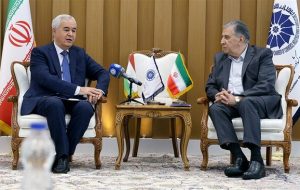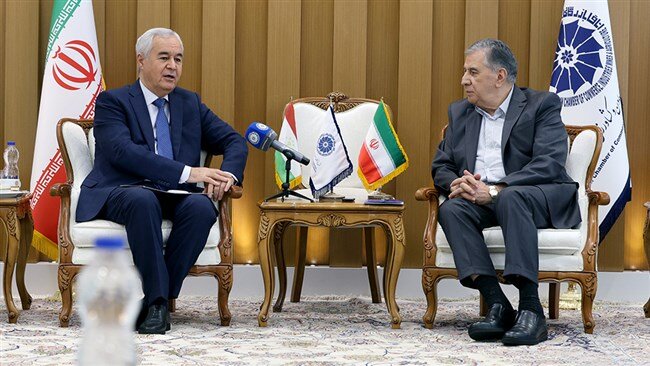Reaching PTA, a prerequisite for boosting Iran-Tajikistan trade
TEHRAN – Iran and Tajikistan have emphasized the need to expedite a preferential trade agreement (PTA) and completely eliminate visa requirements to boost bilateral economic relations, the portal of Iran Chamber of Commerce, Industries, Mines, and Agriculture (ICCIMA) reported. During a meeting in Tehran on Tuesday between ICCIMA Head Samad Hassanzadeh and Tajik Ambassador to


TEHRAN – Iran and Tajikistan have emphasized the need to expedite a preferential trade agreement (PTA) and completely eliminate visa requirements to boost bilateral economic relations, the portal of Iran Chamber of Commerce, Industries, Mines, and Agriculture (ICCIMA) reported.
During a meeting in Tehran on Tuesday between ICCIMA Head Samad Hassanzadeh and Tajik Ambassador to Tehran Nizomiddin Zohidi, both sides highlighted untapped trade potential and the importance of closer collaboration between their business communities.
Hassanzadeh noted that the current trade volume falls far short of the two countries’ capabilities, saying: “Iran has significant potential in knowledge-based areas, engineering services, food industries, petrochemicals, construction materials, tourism, and information technology.”
The official expressed Iranian private sector’s readiness to meet Tajikistan’s needs.
He also called for joint efforts to facilitate trade by exchanging trade delegations and organizing specialized exhibitions, adding that full implementation of visa-free travel could pave the way for deeper partnerships, including the establishment of joint industrial zones.
Zohidi for his part echoed the sentiment, acknowledging progress in trade volume, which has reportedly increased tenfold since 2020. However, he urged efforts to boost bilateral trade to $1.0 billion, inviting Iranian business leaders to explore opportunities in Tajikistan.
Addressing visa challenges, the Tajik ambassador noted that the current exemption applies only to flights between Tehran and Dushanbe and does not include flights operating between Mashhad and Dushanbe. “We plan to launch a new route between Shiraz and Dushanbe, and fully removing visa requirements will enhance tourism and trade.”
Also speaking during the meeting, Mohammad Hossein Roshanak, head of the Iran-Tajikistan Joint Chamber of Commerce, criticized high tariffs on Iranian goods in Tajikistan compared to Uzbek imports, calling for fair trade practices to reduce costs and enhance competitiveness.
As announced by the vice chairman of Iran-Tajikistan Joint Economic Committee stated, Iran’s export to Tajikistan has risen 33 percent in the first half of the current Iranian calendar year (March 20-September 21), as compared to the same period of time in the past yea.
Making the remarks in a meeting between a Tajik Trade Delegation and a number of traders and businessmen from Iran’s North Khorasan province, in Bojnourd, the center of the province, Kazem Shirdel said that the trend of the export of Iranian products to Tajikistan has been rising in recent years.
Stating that the people of Tajikistan are interested in using Iranian products, he added: “Fortunately, the Iranian goods exported to this country are of very high quality, and this makes the people of Tajikistan welcome Iranian goods.”
In late September, senior energy officials of Iran and Tajikistan stressed their willingness to expand energy ties between the two countries.
Iranian Oil Minister Mohsen Paknejad discussed ways of expanding mutual cooperation with Minister of Energy and Water Resources of Tajikistan Daler Juma in a meeting in Tehran at that time.
Speaking at the meeting, Paknejad said capable Iranian companies are ready to enter Tajikistan and Central Asian oil industry’s upstream and downstream activities.
Referring to the cultural, language, civilizational, and historical commonalities of the two countries of Iran and Tajikistan, the oil minister said that expanding economic relations with the friendly and brotherly country of Tajikistan, especially in the energy sector, is of significant importance.
Paknejad continued that some effective steps have already been taken for expanding economic relations with Tajikistan which is hoped to be strengthened in the future.
Elsewhere, the official said that Iranian exploration and production companies with high capabilities are ready to enter Tajikistan and Central Asia’s oil and gas market.
Juma for his part emphasized developing bilateral economic cooperation, particularly in the oil and gas sector, saying: “In 2023, the ceiling of trade exchanges between Iran and Tajikistan reached 300 million dollars, and based on forecasts, it seems that this figure will increase by 60 percent in the current year.”
The Tajik minister noted that trade of crude oil and oil products between the two countries could double their trade exchanges, adding: “We hope that during the visit of the president of the Islamic Republic of Iran to Tajikistan, the necessary preparations for expanding trade with Iran in the oil and gas sector will be made.”
He noted that a significant portion of Tajikistan’s crude oil and petroleum products’ daily needs are currently met through imports adding: “Tajikistan has two oil refineries with a refining capacity of 500,000 tons per year to ensure its energy security.”
“We are interested in having Iranian companies actively participate in Tajikistan’s domestic market,” he continued.
The Minister of Energy and Water Resources of Tajikistan thanked the efforts of Iran’s Oil Ministry for training Tajikistan’s oil and gas industry specialists and requested the Iranian Oil Minister to provide the necessary assistance for conducting advanced courses.
Furthermore, he called for deploying Iranian knowledge-based companies’ capabilities for exploration, development, and production from Tajikistan’s oil and gas fields.
Juma also formally invited Paknejad and Iranian oil industry experts to visit Tajikistan.
In the end, Iran’s Oil Minister emphasized maximum assistance and cooperation with Tajikistan’s Ministry of Energy and Water Resources.
Meanwhile, in mid-June, Iran and Tajikistan signed a memorandum of understanding (MOU) to cooperate in in the field of geomatics.
The MOU was signed by the Director General of the National Cartographic Center of Iran (NCC) Ali Javidaneh and the Chairman of the State Committee for Land Management and Geodesy of Tajikistan.
According to Javidaneh, the MOU was a turning point in enhancing cooperation between the two countries.
The Tajik official also termed the expansion of bilateral cooperation by implementing the agreement as an important step in solidifying and strengthening the bilateral relations, Mehr news agency reported.
Khojazoda Orif Ashuri added that the two countries enjoy high potential and capabilities to expand their cooperation in the relevant field.
Tajikistan’s Ambassador to Iran Zohidi Nizomiddin Shamsiddinzoda, who attended the signing ceremony, expressed hope that Iran and Tajikistan would witness accelerated bilateral cooperation in the field of geomatic sciences and export of technical and engineering services.
Speaking in a later meeting with the head of Iran Mapping Organization to follow up the agreements inked previously between the two countries, the Tajik envoy stated that Iran and Tajikistan signed 44 cooperation documents in the previous three years, which shows that relations between the two countries are on a trajectory of growth.
He pointed to the expansion of relations between Tehran and Dushanbe and said the two sides signed 44 cooperation documents over the past three years.
The envoy underlined that Iran and Tajikistan have witnessed the expansion of political, economic and cultural relations over the past years.
He put the value of trade exchanges between the two countries in the last Iranian year (ended March 19, 2024) at $270 million.
The presidents of the two countries agreed that the value of bilateral trade should reach $500 million in near future and this shows that the bilateral cooperation is on an upward trajectory especially in the fields of trade and economy, the ambassador stressed.
Tajikistan’s capital Dushanbe hosted the 16th meeting of Iran-Tajikistan Joint Economic Committee in late December 2023.
Former Iranian Energy Minister Ali-Akbar Mehrabian and Tajikistan Energy and Water Resources Minister Daler Juma co-chaired the two countries’ Joint Economic Committee meeting.
Meanwhile, the first specialized exhibition “Made in Iran” was also held on the sidelines of this meeting.
The exhibition, aimed at introducing the capabilities of the Islamic Republic of Iran in basic industries, with the presence of 30 top Iranian companies, is being held in Dushanbe, during December 26-29.
Iran and Tajikistan on November 8, 2023 signed a joint statement and 18 cooperation documents and memorandums of understanding (MOUs) to deepen bilateral strategic relations.
The joint statement was signed between late Iranian President Ebrahim Raisi and his Tajik counterpart Emomali Rahmon in Tajikistan’s capital Dushanbe.
The documents and MOUs were inked by the Iranian and Tajik ministers in the presence of the two presidents.
As reported, the documents and MOUs pertained to a roadmap for long-term bilateral trade and economic cooperation till 2030, mutual visa-free access, anti-drug trafficking operations, transportation, crisis management, and the establishment of joint free economic zones, as well as inter-city cooperation in various fields.
During a meeting earlier in the day, Raisi said Iran and Tajikistan could increase their annual trade transactions to $500 million in the first step.
Raisi stressed that historical, religious, and cultural commonalities shared by the two countries provide a favorable ground for enhancing bilateral relations in all aspects.
The Tajik president, for his part, highlighted the necessity to develop bilateral ties, particularly in mining, health, science and technology, and agriculture sectors
Heading a high-ranking delegation, Raisi arrived in Dushanbe on November 8, 2023. During the day, he also attended a meeting of the two countries traders and businessmen.
EF/MA
Photo: ICCIMA Head Samad Hassanzadeh (R) and Tajik Ambassador to Tehran Nizomiddin Zohidi
